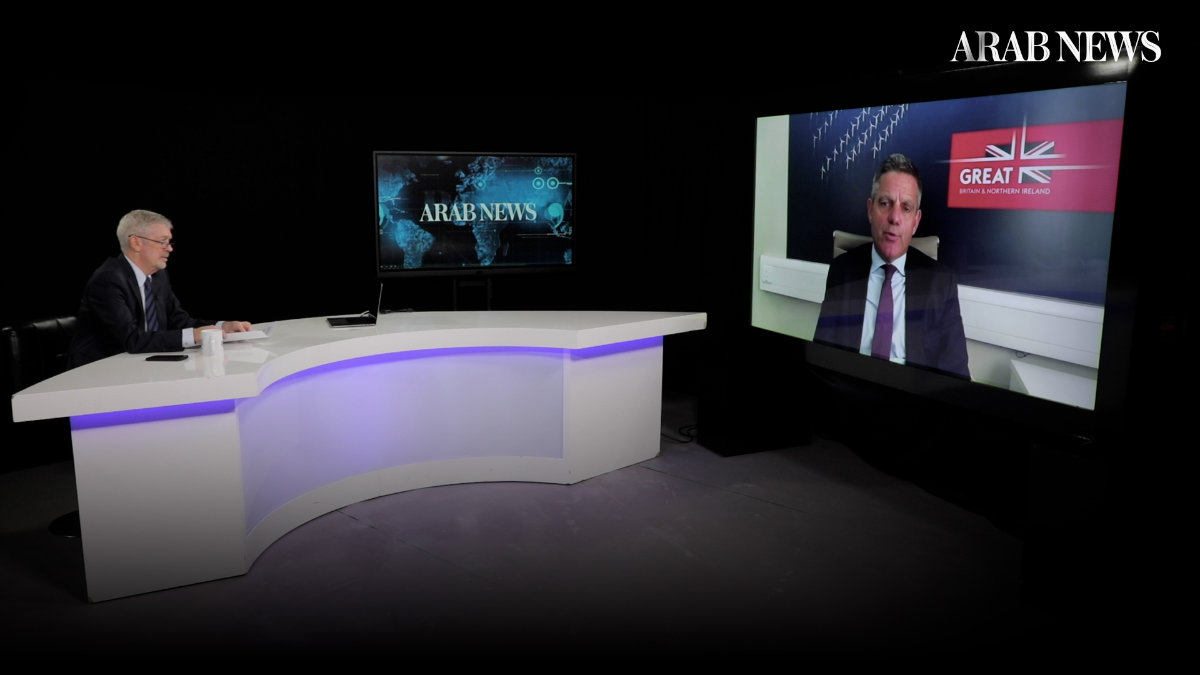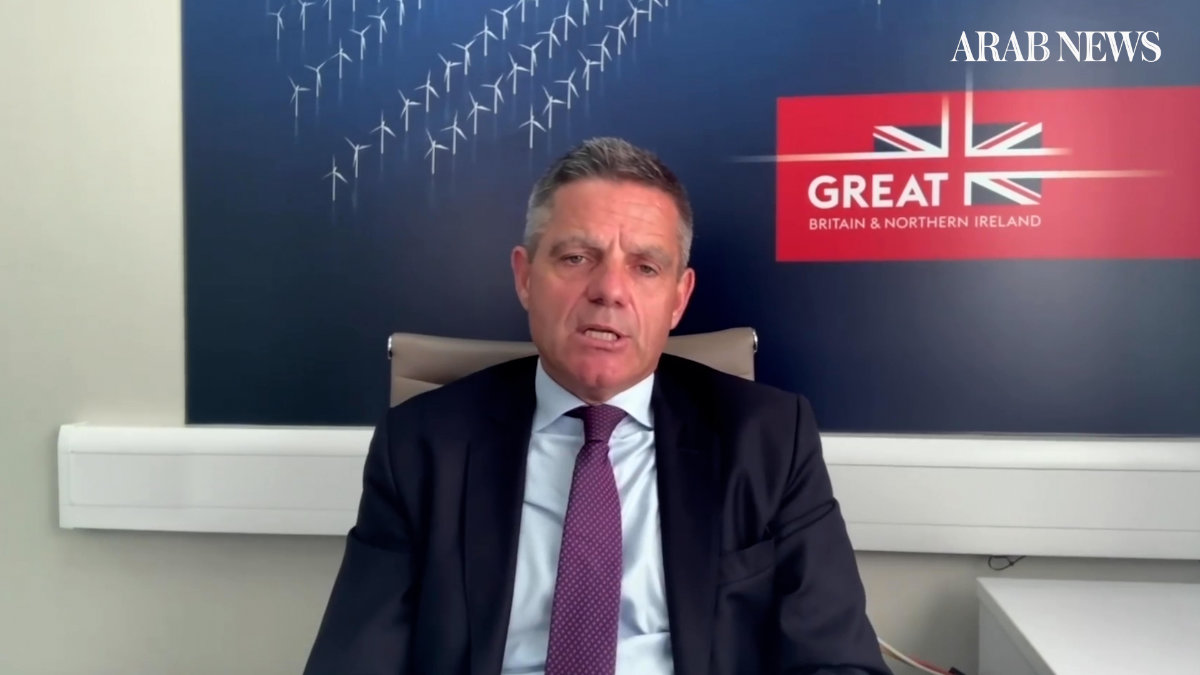DUBAI: Escalating terror attacks by Iran-backed Houthis will not deter British businesses from expanding investment in the Middle East, the UK official responsible for his country’s trade with the region told Arab News.
“The GCC, and within that the UAE, have been very popular destinations for both UK exporters and tourists over many years, and we certainly don’t see any drop-off in that interest,” Simon Penney, UK trade commissioner for the Middle East, said.
“In fact, the Gulf more broadly is the UK’s third-largest export market globally, outside of the EU. We are highly confident and have every reason to believe that our position as an exporting nation to the Gulf will improve even further in the years ahead.”
He was speaking after a spate of air strikes on the UAE, claimed by backers of Yemen’s Houthi militia, in an escalation of the terror campaign that has seen drones and missiles aimed at population centers and civilian infrastructure in Saudi Arabia.
The UK authorities warned British citizens of an increased threat and urged them to be vigilant, ahead of a visit by Prince William, the Duke of Cambridge, to the UAE this week. But Penney insisted that such threats would not dent the enthusiasm of British business for investment in the region.

Simon Penney, a veteran banker, highlighted the attractions of Saudi Arabia as a trade partner for the UK. (Screen grab from Frankly Speaking video)
“We continue to see a very strong and healthy pipeline of companies doing business here,” he said.
“In fact, only last week we had (in Dubai) the Arab Health (trade fair). More than 140 UK companies made the trip out here, which was fantastic to see, not only in light of the events that you highlighted but also off the back of two years of COVID-19.”
In a wide-ranging interview on “Frankly Speaking,” the series of video conversations with leading policymakers and business people in the region, Penney — who is also the British consul in Dubai — spoke of the “passionate” interest of UK business in many sectors of Saudi Arabia’s Vision 2030 economic transformation strategy, the imminent prospects for a UK-GCC free trade agreement, and the potential for the Middle East to help compensate for some of the trade forgone by the UK in the post-Brexit world.
Penney, a banker in the Middle East before he took up his current role in 2018, highlighted the attractions of Saudi Arabia as a trade partner for the UK.
“I have to say I’m very passionate about the Kingdom. I’ve been working there in my various different jobs for more than a decade now and I’m as enthusiastic if not more today than I’ve ever been about the opportunities that exist in the Kingdom and across the whole of the Kingdom.”
“It’s not just about Saudi Arabia. We see a lot of activity in Qatar, obviously, with the FIFA World Cup coming up later this year, but also beyond that, in Oman, Bahrain and Kuwait. There really is a lot of interest in this region both ways.”
He added: “In fact, only the week before last I had the opportunity to visit NEOM and I was absolutely blown away by the sheer scale of the project, by the ambition of the project, from what can only be described, really, as a blank sheet of paper today.”
UK interest in Saudi Arabia was strong across all sectors that have been energized by the Vision 2030 strategy, he said, including healthcare, education, food and drink, and leisure and entertainment.
“And energy, of course. You know, as the Kingdom and the world embarks on this journey of energy transformation toward ‘clean growth,’ we’re seeing increasing interest around ‘clean growth’ and how we can work with the Kingdom to develop the technologies of the future,” Penney said, referring to the goal of simultaneously increasing national income and cutting greenhouse gas emissions.
British companies in the region were looking increasingly at Saudi Arabia rather than other GCC countries.
“In the UAE alone, we have 5,000 UK companies that call the UAE their home but, interestingly, as those companies look increasingly across the region for future business opportunities, it really is clear that Saudi Arabia, in particular, is going to be a major source of opportunity for those businesses,” he said.
Penney touched on the reaction in the UK to the recent proposals by the government of Saudi Arabia, which will require multinational companies to have their headquarters in Riyadh in order to conduct official business in the Kingdom.
“I think it’s varied. I know a lot of large British businesses that have been working in the Kingdom for quite some time that are actually embracing that because it makes good business sense — it’s where the majority of the business that companies are starting to do is, and you know it makes sense to be located in the Kingdom,” he said.
“I know other companies have a slightly longer-term watching brief on that. But I think companies will make decisions around what makes commercial sense. Certainly, in a lot of the companies that I’ve spoken to, based on what I said around the scale of opportunity that Saudi presents, that actually it will make good business sense to do so.”
Penney said: “It’s not just about Saudi Arabia. We see a lot of activity in Qatar, obviously, with the FIFA World Cup coming up later this year, but also beyond that, in Oman, Bahrain and Kuwait. There really is a lot of interest in this region both ways.”

Simon Penny says the GCC is the UK’s third-largest export market, outside of the EU, third behind the US and China. (Screen grab from Frankly Speaking video)
As someone who has been closely involved in preparations for a free trade agreement between the UK and the GCC, Penney outlined the next steps of that negotiations process.
“We will be launching negotiations for a GCC free trade agreement in the spring of this year,” he said.
“We have just concluded a parliamentary process, which is a uniquely UK process we need to go through before we can launch FTA negotiations. That 14-week consultation closed in mid-January.”
He added: “We’re now going through a process of assimilating and capturing all the feedback that we received from businesses and stakeholders during that consultation period. We’re factoring that into the negotiating strategy and approach the UK will adopt as we commence those FTA negotiations with the GCC.”
Since the decision to leave the EU, the UK has been seeking to put in place trade alliances with other major economic blocs as part of the “Global Britain” strategy. However, Penney insisted a UK-GCC agreement was not just a way of compensating for business lost with Europe in the wake of Brexit.
“On the contrary, I think, if anything, it’s going to spur business further. The GCC already is the UK’s third-largest export market, outside of the EU, third behind the US and China,” he said.
“So, already today the Gulf features very highly in the minds of UK exporters. We’re highly confident that by putting in place a free trade agreement, we’ll be able to reduce even further some of the barriers and impediments that businesses face in doing business here, which are not unique to the Gulf.”
Penney insisted that political uncertainty in the UK, where Prime Minister Boris Johnson is increasingly beleaguered after a series of scandals, would not deter Middle East investors from doing business with the UK.
“We don’t see any let-up in investor interest in the UK,” he said.
“In fact, since we’ve left the EU and the referendum in 2016, in particular, we’ve seen investor interest increase exponentially. Confidence in the UK, I would say, is probably the highest we have seen for a very long time.”






























